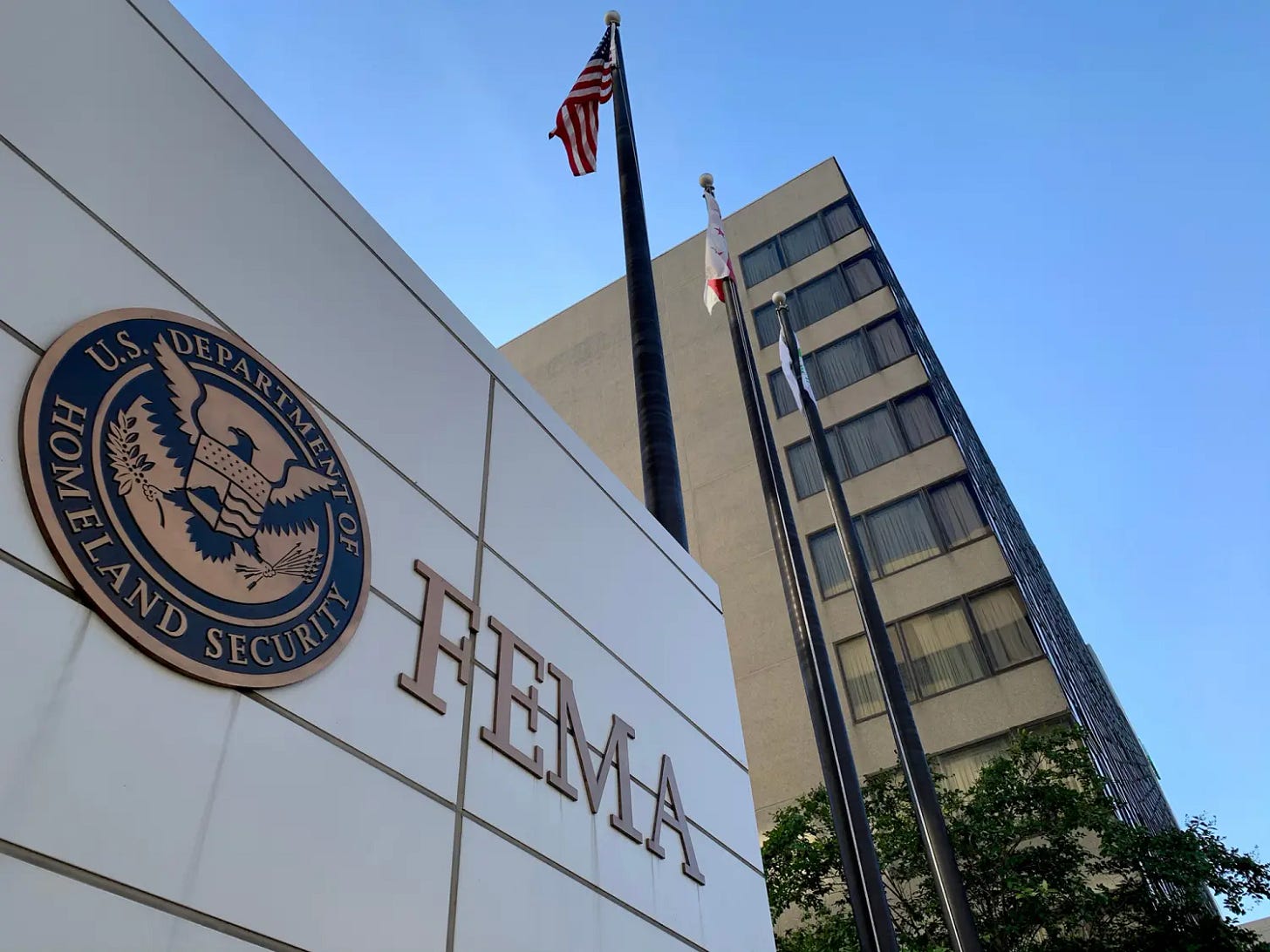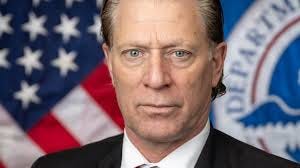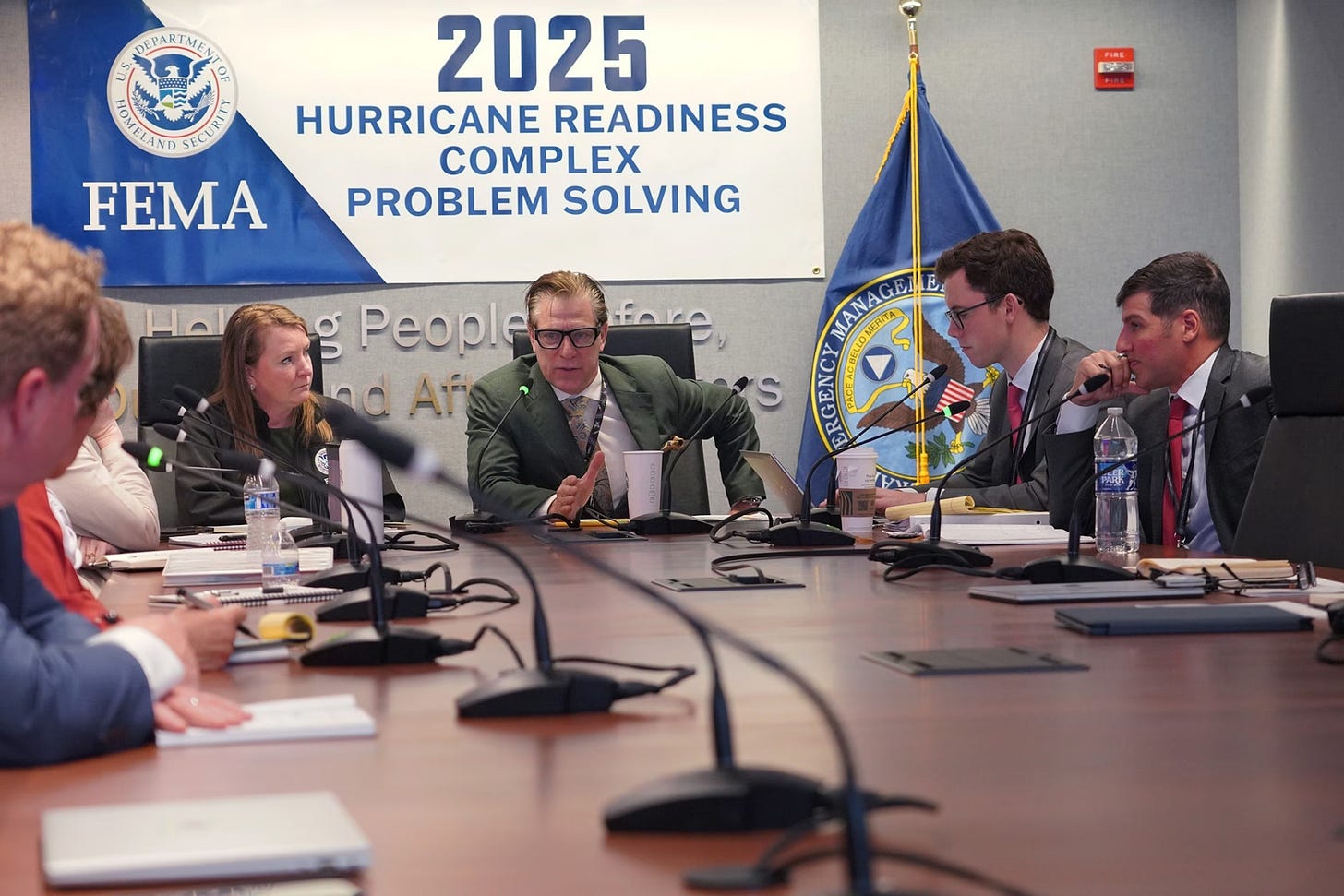Executive Agency Actions You Need to Know About - June, 2025
Actions of HHS, DHS, FEMA, DOJ, and DOL: The Capitol Hill Reader # 98
Hello Readers,
Welcome to issue #98 of the Capitol Hill Reader.
We have compiled a series of executive agency actions for the month of June that you need to know about
Table of Contents
DHS - FBI Task Force Overhaul
DOJ Civil Division Enforcement Directive
Department of Health and Human Services Restructuring, Firings, and more
DOL Opinion Letter Program
FEMA Leadership Crisis
We spend a lot of time on these newsletters, so if you’d like to show us some totally optional but greatly appreciated support, consider becoming a free or paid subscriber today. For a limited time, get the Byrd Bath special: 50% off a year’s subscription.
DO YOU LIKE HISTORY? DO YOU LIKE POLITICS? ARE YOU A NERD? SUBSCRIBE TODAY!
Agency acronym key:
DHS - Department of Homeland Security
DOJ - Department of Justice
HHS - Department of Health and Human Services
DOL - Department of Labor
FEMA - Federal Emergency Management Agency
1. DHS–FBI Task Force Overhaul
According to a ProPublica exposé released June 25, internal documents and interviews revealed that a new joint task force led by the Department of Homeland Security (DHS) and Homeland Security Investigations (HSI), with nominal support from the FBI, was recently created to combat transnational crime [1]. This move would subordinate the Drug Enforcement Agency to DHS and HSI, regardless of the fact that the DEA has been the lead narcotics trafficking enforcement agency spanning decades [1].
The task force’s initiative gives DHS expanded authority to initiate or redirect criminal investigations, many of which traditionally fell under the jurisdiction of the Department of Justice (DOJ). On the surface, prosecutorial discretion now rests increasingly with political appointees rather than neutral DOJ attorneys [1].
Per the ProPublica article:
The administration’s plans, described in internal documents and by government officials, would reduce federal prosecutors’ control over investigations, shifting key decisions to a network of task forces jointly led by the FBI and Homeland Security Investigations, the primary investigative arm of DHS.
Officials said the plan to bring law enforcement agencies together in the new Homeland Security Task Forces has been driven primarily by President Donald Trump’s homeland security adviser, Stephen Miller, who is closely overseeing the project’s implementation [1].
The task force derives its legal basis from President Trump’s January executive order titled “Protecting the American People Against Invasion” and significantly increases the prosecutorial role of ICE [1].
A recently fired DOJ attorney weighs in, per ProPublica:
“To the administration’s credit, they are trying to break down barriers that are hard to break down,” said Adam W. Cohen, a career Justice Department attorney who was fired in March as head of the office that coordinates organized crime investigations involving often-competing federal agencies. “But you won’t have neutral prosecutors weighing the facts and making decisions about who to investigate,” he added of the task force plan. “The White House will be able to decide” [1].
In other words, the White House will make decisions on who to investigate and who to not investigate, which cases to pursue and which to let lie, and, overall, the final say in how these investigations are planned, coordinated, and executed.
2. DOJ Civil Division Enforcement Directive
A June 11 memorandum from Brett Shumate, Assistant Attorney General of the DOJ Civil Division, directed attorneys to prioritize enforcement efforts using the False Claims Act (FCA) against programs involving diversity, equity, and inclusion (DEI), sanctuary jurisdictions, naturalized immigrants, and gender-affirming care [2]. This new focus marks a sharp departure from traditional civil enforcement and aligns closely with the administration’s internal priorities.
Specifically, the memo encourages civil attorneys to initiate or expand FCA investigations into universities, hospitals, grant recipients, and others that support DEI, immigrant-focused initiatives, or participate in transgender healthcare [2,3].
The False Claims Act (FCA) is a federal law that allows the government or private whistleblowers to sue individuals or entities that knowingly submit false claims for federal funds, with penalties including treble damages - that is, three times the amount of the government’s losses.
For example, if a university receives federal funds (like grants, contracts, or student aid programs) and knowingly certifies that it complies with federal anti-discrimination laws (like Title VI or Title VII), but is then found to be using DEI policies that now violate those laws (such as showing “racial preference,” etc), the government - or a whistleblower - could claim that this certification was false.
The next phase could happen two ways:
either the DOJ would investigate and indict,
or a private citizen could file a Qui Tam lawsuit on behalf of the federal government. They would then get a %15-30 cut of the winnings.
Qui tam (short for "qui tam pro domino rege quam pro se ipso in hac parte sequitur," or ‘who sues on behalf of the king as well as for himself’ in Latin) is a legal provision under the False Claims Act that allows a private individual -called a relator in legalese - to sue on behalf of the U.S. government if they believe someone has defrauded federal funds. Then yes, they get a cut of the cash.
A similar strategy could be used against a doctor that provides transgender healthcare, a city that operates a sanctuary jurisdiction for undocumented immigrants, and many other scenarios.
Notably, there is a section regarding “denaturalization” of naturalized citizens of the United States. Officially, “denaturalization is the legal process by which the U.S. government revokes someone's citizenship after it has already been granted through naturalization. Per the memo, individuals who have the following cases pending can be denaturalized:
Cases against individuals who pose a potential danger to national security, including those with a nexus to terrorism, espionage, or the unlawful export from the United States of sensitive goods, technology, or information raising national security concerns;
Cases against individuals who engaged in torture, war crimes, or other human rights violations;
Cases against individuals who further or furthered the unlawful enterprise of criminal gangs, transnational criminal organizations, and drug cartels;
Cases against individuals who committed felonies that were not disclosed during the naturalization process;
Cases against individuals who committed human trafficking, sex offenses, or violent crimes;
Cases against individuals who engaged in various forms of financial fraud against the United States (including Paycheck Protection Program (“PPP”) loan fraud and Medicaid/Medicare fraud);
Cases against individuals who engaged in fraud against private individuals, funds, or corporations;
Cases against individuals who acquired naturalization through government corruption, fraud, or material misrepresentations, not otherwise addressed by another priority category;
Cases referred by a United States Attorney’s Office or in connection with pending criminal charges, if those charges do not fit within one of the other priorities; and
Any other cases referred to the Civil Division that the Division determines to be sufficiently important to pursue [3].
The memo contains the following:
Per this paragraph, naturalized immigrants could be targeted for any reason the Civil Division determines to be valid, regardless of the actual crime committed. This caveat gives the DOJ broad discretion in denaturalizing citizens born abroad [3].
3. HHS Restructuring, Firings, and more
On June 9, HHS Secretary Robert F. Kennedy Jr. removed every member of the CDC’s Advisory Committee on Immunization Practices, accusing them of conflicts of interest and bias; soon after, they were replaced with individuals known for vaccine skepticism [18].
While testifying in front of the House Energy and Commerce Committee (Health Subcommittee) on June 24, Kennedy Jr. stated that HHS has reinstated over 700 employees of the CDC and over 200 employees of the NIH [6]. He also stated that HHS had reinstated about 300 employees to the National Institute for Occupational Safety and Health, “including a program that that provides care for first responders and survivors of the 9/11 attacks” [6].
Officially, HHS has prohibited public discussion of the layoffs until after July 4, but operational gaps have nevertheless emerged across public health monitoring, grant administration, and biomedical research. For example, the Milwaukee Health Department has refuted Kennedy’s claims that the Childhood Lead Program is still operating in the city. In a recent hearing, the Secretary said “we have a team in Milwaukee,” but MHD said that this is not true. State officials went on to say that the program is currently defunct and not operating, with federal employees assigned to the crisis remaining laid off at this time [7].
The following programs have also reported significant disruptions or operational roadblocks due to the layoffs and funding cuts:
Vaccines for Children (VFC)
Immunization Information Systems (IIS)
National Notifiable Diseases Surveillance System (NNDSS)
Influenza and COVID-19 Surveillance
Maternal and Child Health Block Grant (Title V)
Home Visiting Program (MIECHV)
Rural Health Clinics (RHC) Program
Telehealth Resource Centers
State Opioid Response (SOR) Grants
988 Suicide & Crisis Lifeline Support
Ending the HIV Epidemic Initiative
Ryan White HIV/AIDS Program
CDC’s National Institute for Occupational Safety and Health (NIOSH).
While none of these programs have been terminated outright, their continued existence is, for now at least, tenuous, and their current operations hindered or halted altogether.
Attempts to rehire some affected employees have led to contradictory messaging and temporary contract work arrangements [5].
Following this hearing on June 25, Secretary Kennedy announced the U.S. will cease funding Gavi - previously its third-largest donor - citing vaccine safety concerns from a controversial (and widely disputed) study linking DTP vaccines to increased child mortality. Gavi, which provides vaccines to children in some of the world’s poorest countries, strongly refuted his claims [17].
At a June 26–28 Make America Healthy Again tour in Oklahoma and Louisiana, Kennedy backed local measures urging a stop to water fluoridation and food dyes, emphasizing personal choice - even as he admitted removing fluoride could “mean more cavities” among underserved kids [19].
4. DOL Opinion Letter Program
On June 2, the Department of Labor reinstated the use of “opinion letters,” a regulatory guidance tool used during the previous Trump administration, which allows employers to request official interpretations of labor laws based on specific scenarios or business practices [8,9,10].
While these letters do not offer formal pre-clearance, they can provide a “good faith” defense if followed, potentially shielding employers from liability. The DOL will continue conducting audits and investigations in high-risk industries such as agriculture, meat processing, warehousing, and mining; however, the scope and frequency of these spontaneous inspections have been significantly reduced. Instead, the agency is shifting its emphasis toward so-called “reactive enforcement” - prioritizing audits that arise from formal worker complaints or litigation [10].
This change may create barriers for workers in industries where fear of retaliation or lack of awareness makes official complaints less likely. As a result, some labor advocates worry that workers could face greater vulnerability to wage theft or unsafe conditions without a strong enforcement backstop.
The move signals a broader strategic pivot by the DOL and other agencies toward employer self-regulation, with enforcement resources increasingly focused on written guidance and good faith rather than proactive oversight.
How do opinion letters work in practice? Here is a hypothetical scenario:
Let’s say a national logistics company, Gaspode & Sons, is considering a new scheduling model for its warehouse staff that would allow workers to clock in for three split shifts per day during peak delivery windows. Unsure whether this structure complies with the Fair Labor Standards Act’s (FLSA) overtime and recordkeeping rules, the company’s HR compliance team submits a formal request to the DOL’s Wage and Hour Division for an opinion letter. In their request, they provide detailed information about shift timing, rest periods, and compensation structure.
A few months later, the DOL issues an opinion letter stating that the proposed model - provided it includes appropriate documentation and compensates workers for all hours worked, including split shift premiums, overtime, etc - does not violate FLSA. Gaspode & Sons then uses this letter as a legal safeguard, hopefully implementing what it learned to align with federal labor law.
There are some issues with this system, as it places a good deal of trust in companies to do the right thing and follow opinion letter guidance; it also assumes that companies will submit opinion letters before employing potentially illegal labor practices.
That said, if a company goes against opinion letter guidance, they forfeit the “good faith” caveat of the provided legal shield, leaving them open to increased fines, back pay, and further litigation.
For example, in the real world scenario of Christensen v. Harris County (2000), Harris County, Texas adopted a policy requiring sheriff’s deputies to use accrued compensatory time to avoid overtime payout [12]. Seeking clarity, the county requested - and received - a DOL opinion letter advising that such a policy did violate the Fair Labor Standards Act (FLSA) because employees could not be compelled to use compensatory time without their agreement. Despite this clear guidance, the county pressed ahead with the policy [12].
Eventually, deputies sued and took their case to the Supreme Court. While the Court ultimately ruled that the FLSA did not actually prohibit the policy, it explicitly noted that DOL opinion letters do not receive Chevron deference (the highest judicial deference at the time, since abolished) but rather Skidmore deference, meaning courts give them respect based on their “persuasiveness and consistency,” not binding force [11].
Harris Country (2000) highlights that even when DOL’s opinion letter is disregarded, the agency’s enforcement role sometimes shifts to judicial review and public scrutiny.
Ignoring a DOL opinion letter strategy can backfire though: workers can use it as evidence of knowing non-compliance, potentially influencing courts, reputations, and, most importantly, settlements - even if a company’s violation is not really enforceable.
The DOL also tracks opinion letters and may use them to design future audits or identify systemic enforcement gaps. Theoretically at least.
Here is a list of agencies that will release opinion letters:
The Wage and Hour Division will issue opinion letters.
The Occupational Safety and Health Administration will provide letters of interpretation.
The Employee Benefits Security Administration will release advisory opinions and information letters.
The Veterans’ Employment and Training Service (VETS) will issue opinion letters.
The Mine Safety and Health Administration will provide compliance assistance resources through its new MSHA Information Hub [8].
5. FEMA Leadership Crisis
On June 2, acting Federal Emergency Management Agency Administrator David Richardson sparked confused alarm among agency staff during an internal briefing; Richardson remarked that he was unaware the U.S. had a hurricane season - just as the 2025 Atlantic season officially began on June 1.
In regard to this season, the NOAA has forecasted above-average weather activity and up to 10 hurricanes [15].
The comment, which a DHS spokesperson later dismissed as a joke (FEMA is subordinate to DHS), nonetheless triggered widespread concern among career FEMA officials who noted that Hurricane Preparedness Protocols and training sessions had already been reduced amid ongoing staffing cuts [15].
With around one-third of full-time FEMA personnel laid off or departed since January and hurricane training noticeably curtailed, Richardson’s admission fed into a broader narrative of declining readiness and management shortfalls (whether it was a joke or not).
Behind closed doors, some planners reported that updates to the agency's hurricane response plan had been canceled, with intentions to revert to the previous year’s protocols instead of issuing a new, season-specific strategy [16].
FEMA usually constructs a new protocol each year, focusing on new threats, lessons learned from last season, and interagency coordination.
Also, Richardson’s leadership style has raised eyebrows. In an earlier all-hands meeting, he reportedly warned, “don’t get in my way,” declaring he would “run right over” any resistance [16]. This aggressive posture, combined with his lack of formal emergency management experience, prompted criticism from lawmakers who publicly questioned his competence and urged his removal [16].
Meanwhile, Richardson deferred to the newly reinstated FEMA Review Council - aligned with Trump’s agenda - opting not to issue a new disaster response plan, and instead rolling back critical updates just as hurricane-prone communities were bracing for the season [16].
Unfortunately, the effects of these actions are already apparent: last month, a devastating tornado struck St. Louis, Missouri, causing extensive damage and resulting in five fatalities [13]. Despite the severity of the disaster, Missouri's formal request for federal assistance was not approved until 49 days later, with two FEMA centers opening in the city just yesterday [13]. This marks the slowest response in the state in over 15 years and contrasts sharply with the response to the 2011 Joplin tornado, where federal assistance was granted the day after the disaster [14].
The prolonged wait for aid has left many residents and local officials feeling frustrated and abandoned without critical resources, like food, water, and power.
Using this example, one can see why communities are worried about the season ahead.
Thank you for reading the Capitol Hill Reader
If you enjoyed this issue, consider becoming a free or paid subscriber to support our work.
Our next installment, the Capitol Hill Reader #99, will cover the Senate’s “vote-o-rama” towards passing the budget reconciliation bill, as well as Parliamentarian updates.
Message us with questions and/or concerns. Thanks again for reading.
Works Cited
1.) https://www.propublica.org/article/stephen-miller-trump-dhs-fbi-doj-war-on-drugs
2.) https://blog.freshfields.us/post/102kprk/doj-civil-division-prioritizes-illegal-dei
3.) https://www.justice.gov/civil/media/1404046/dl?inline
4.) https://lofgren.house.gov/sites/evo-subsites/lofgren.house.gov/files/evo-media-document/Stop%20Project%202025%20Task%20Force%27s%20Project%202025%20Subject-by-Subject%20Breakdown_7.26.2024.docx-compressed.pdf
5.) https://federalnewsnetwork.com/workforce/2025/04/humiliating-and-degrading-hhs-employees-learn-of-layoffs-when-their-id-badges-stop-working/
6.) https://www.biopharmadive.com/news/hhs-rehiring-staff-rfk-hearing-layoffs-cdc-nih/751556/
7.) https://www.nbcnews.com/health/kids-health/cdcs-childhood-lead-program-still-defunct-kennedys-claims-rcna208047
8.) https://www.fordharrison.com/dol-relaunches-opinion-letter-program-amid-shifting-enforcement-priorities
9.) https://www.dol.gov/newsroom/releases/osec/osec20250602
10.) https://www.wagehourlitigation.com/2025/06/dear-dol-labor-department-re-launches-opinion-letter-program/
11.) https://ballotpedia.org/Skidmore_deference
12.) https://en.wikipedia.org/wiki/Christensen_v._Harris_County
13.) https://www.yahoo.com/news/4-tornado-disaster-recovery-centers-225747282.html
14.) https://missouriindependent.com/2025/06/04/st-louis-waits-for-aid-as-fema-response-to-missouri-disasters-is-slowest-in-15-years/
15.) https://www.chron.com/news/article/hurricane-season-fema-chief-20357861.php
16.) https://www.reuters.com/world/us/fema-staff-confused-after-head-said-he-was-unaware-us-hurricane-season-sources-2025-06-02/
17.) https://www.washingtonpost.com/health/2025/06/26/rfk-jr-vaccine-gavi-funding-cut/?utm_source=chatgpt.com
18.) https://www.politico.com/news/2025/06/09/rfk-jr-to-fire-all-members-of-the-cdcs-vaccine-advisory-committee-00395235
19.) https://www.hhs.gov/press-room/secretary-kennedy-maha-tour-oklahoma-louisiana-legislation.html


















Thank you for taking the time to write such a clear and thorough explanation about the effects of all these executive agency actions. These actions are going to set this country back decades.
No good can come of these changes 😖 Excellent article, and will reStack ASAP 💯👍